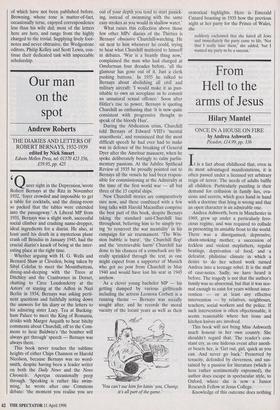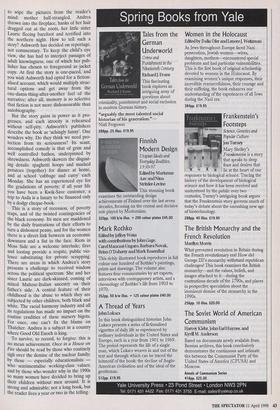From Hell to the arms of Jesus
Hilary Mantel
ONCE IN A HOUSE ON FIRE by Andrea Ashworth Picador, £14.99, pp. 336 It is a fact about childhood that, even in its most advantaged manifestations, it is often passed under a licensed yet arbitrary reign of terror. The needs of adults baffle all children. Particularly puzzling is their demand for collusion in family lies, eva- sions and secrets, which goes hand in hand with a doctrine that lying is wrong and that an open character is an admirable one.
Andrea Ashworth, born in Manchester in 1969, grew up under a particularly fero- cious regime, and was required to collude in presenting its amiable front to the world. There was a disorganised, depressive, chain-smoking mother, a succession of feckless and violent stepfathers, regular beatings, deprivation of food, and a defeatist, philistine climate in which a desire to do her school work turned Andrea into a teenage rebel. It is the stuff of case-notes. Sadly, we have heard it before. The tragedy is not that the author's family was so abnormal, but that it was nor- mal enough to exist for years without inter- vention — or at least any effective intervention — by relatives, neighbours, teachers, social workers and the police. If such intervention is often objectionable, it seems reasonable where hot irons and kitchen knives are involved.
This book will not bring Miss Ashworth much honour in her own country. She shouldn't regard that. The reader's con- stant cry, as one hideous event after anoth- er besets her, is 'Get out, girl, quick as you can. And never go back.' Preserved by tenacity, defended by cleverness, and sus- tained by a passion for literature (which is here rather sentimentally expressed), the author does escape in spectacular style, to Oxford, where she is now a Junior Research Fellow at Jesus College.
Knowledge of this outcome does nothing to wipe the pictures from the reader's mind: mother half-strangled, Andrea thrown into the fireplace, hanks of her hair dragged out at the roots, her little sister Laurie fleeing barefoot and terrified into the northern night. How to tell such a story? Ashworth has decided on reportage, not commentary. To keep the child's eye view, she has had to interject passages of adult knowingness, one of which her pub- lisher has chosen to foreground as jacket copy. At first the story is one-paced, and you wish Ashworth had opted for a fiction- alised account, which would multiply struc- tural options and get away from the one-damn-thing-after-another feel of the narrative; after all, memory is so selective that fiction is not more dishonourable than autobiography.
But the story gains in power as it pro- gresses, and each atrocity is rehearsed without self-pity. Ashworth's publishers describe the book as 'achingly funny'. One wonders why. Do they think we need pro- tection from its seriousness? Its scant, accomplished comedy is that of grim and well controlled bathos, underpinned by shrewdness. Ashworth skewers the disgust- ing details: spaghetti hoops and mashed potatoes (together) for dinner at home, and at school 'cabbage and curry' each Monday. She has an experienced eye for the gradations of poverty; if all your life you have been a Kwik-Save customer, a trip to Asda is a luxury to be financed only by a dodgy cheque-book.
This is a story of recession, of poverty traps, and of the twisted contingencies of the black economy. Its men are maddened by the daily frustrations of their efforts to turn a dishonest penny, and for the women there is a direct link between an economic downturn and a fist in the face. Riots in Moss Side are a welcome interlude; fires and looting provide a respite, public vio- lence substituting for private scrapping. There are areas in which Andrea's story presents a challenge to received wisdom across the political spectrum. She and her sister Laurie are dark-skinned, coming of mixed Maltese-Italian ancestry on their father's side. A central feature of their childhood is the abuse to which they are subjected by other children, both black and white. The racial harmony industry and all its regulations has made no impact on the routine crudities of these nursery bigots. For once, one can't fix the blame on Thatcher. Andrea is a subject in a country where Good Old Enoch is king.
To survive, to record, to forgive: this is no mean achievement. Once in a House on Fire should be read by those who routinely sigh over the demise of the nuclear family; by those — especially educationalists who sentimentalise working-class values; and by those who wonder why in the 1990s so many women have decided to bring up their children without men around. It is strong and admirable; not a long book, but the reader lives a year or two in the telling.



































































 Previous page
Previous page